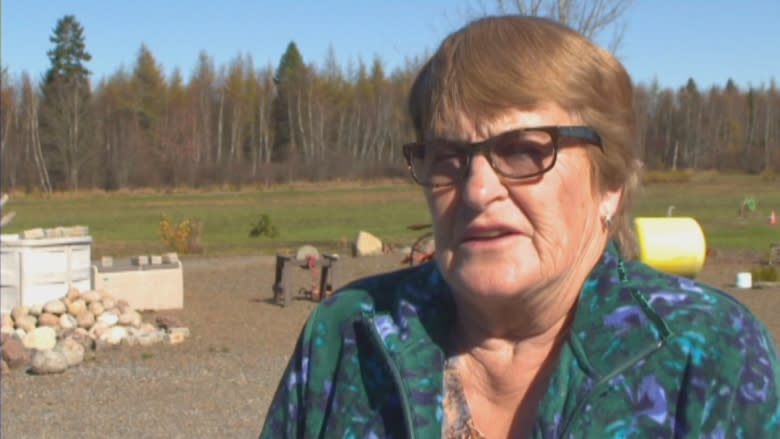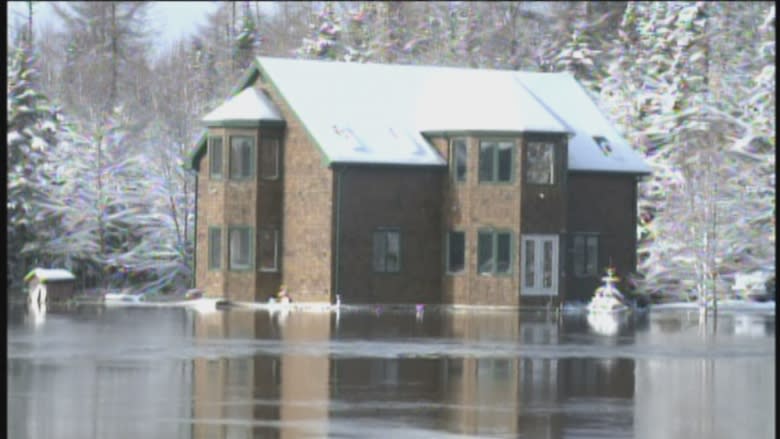Flood compensation from Ottawa may take years
Mary Guitard lost her home in a devastating flood that hit Charlotte County two weeks before Christmas in 2010.
But she was quickly set up in a new home thanks in part to generous disaster financial assistance provided by the federal and provincial governments.
"The government helped me. They helped everybody that was in the flood. In a year I was in a new house and I'm fine since then," said Guitard.
"That's all I can say. I can't remember everything that happened back in 2010."
Guitard doesn't like to dwell on the past and she has happily relegated the flood she endured to a distant memory.
But it's a different story for the New Brunswick government which, according to federal records, is still owed millions of dollars in reimbursements from Ottawa for what it spent on the Charlotte County disaster more than seven years ago. And it's owed millions more for a number of events that have hit New Brunswick since then.
It means the province, which may have to spend up to $80 million to repair damage and help victims of recent flooding get back on their feet, is not likely to fully recoup the federal government's share of that substantial bill — which could be 80 percent or more of the eventual total — until sometime during the next decade.
"It is not unusual for final payments to be made a number of years after an event has occurred," explained Karine Martel, a spokesperson with Public Safety Canada, the federal department that handles national disaster assistance requests.
"The province has five years to submit a final request for payment to the federal government, and can request a further extension."
That's a big issue for New Brunswick, which over the last decade has become the most frequent user of Canada's disaster financial relief program and is now facing the most expensive event it has ever had to deal with.
Including the past month's flooding along the St. John River, New Brunswick has registered for disaster assistance from Ottawa thirteen times since 2008 —the most of any province.
But registering for help and getting paid are different issues.
New Brunswick's department of public safety did not respond to questions about how rapidly it's been able to access federal money following recent disasters, but according to federal records access hasn't been especially quick.
Only 3 complete payments
As of April this year, New Brunswick had received full payment in only three of the thirteen incidents registered with the federal government since 2008, with the other ten disaster requests, including two from as far back as 2010, still open.
Six of the ten requests for help that are still pending have qualified for advance payments from Ottawa —but getting all the money owed from all the disasters is a lengthy and painstaking procedure.
Last week Lisa Munn from New Brunswick`s Emergency Measures Organization told reporters the province is hopeful of getting a down payment from Ottawa to help with current flood expenses, but even that can take more than a year.
"Once we get approval from Ottawa, what we do is we ask for an advance payment based on the total amount [of damage]," said Munn.
Still, it takes time to fully tally damage in order to even ask for an advance.
Victims of disasters are given 90 days to register for help, then evaluations of what assistance they're eligible for have to be carried out.
Following post-tropical storm Arthur in 2014, New Brunswick did receive an advance payment from Ottawa of $2.9 million to help with recovery, but not until December 2016, two and a half years after the storm.
The remainder of the Arthur assistance payment is still pending, at least according to federal records.
It`s not clear whether delays are caused mostly by the federal government scrutinizing provincial expenses down to the nickel before paying, or whether there have been problems with the paperwork New Brunswick has been submitting to receive assistance.
In a review the federal government conducted of its share of the program last year, it was noted without elaboration or naming offenders that there have been "inconsistencies in quality of provincial submissions" for assistance.
If properly documented by the province, Ottawa does eventually pay most of the cost of a large disaster.
According to the funding agreement, federal contributions begin when costs for a disaster event in New Brunswick exceed $2.3 million, with Ottawa required to pay 90 percent of all eligible costs above $11.6 million.
That means most of the costs of the current flood recovery should eventually be paid by the federal government, although history shows it may take years to get it.
Events prompt disaster assistance
New Brunswick events that have triggered disaster assistance:
- April 2008 - St. John River spring flooding
- August 2008 - Heavy rains cause flash floods in central and northern N.B.
- September 2008 - Tropical storm Hanna
- December 14, 2010 - Heavy winter rain causes flooding in Charlotte County
- December 21, 2010 - Heavy rains cause flooding in eastern N.B.
- March 2012 - Early heat wave causes ice jams and flooding in upper St. John River
- April 2014 - Mild weather triggers spring flooding in central and eastern N.B.
- July 2014 - Post-tropical storm Arthur
- December 2014 - Heavy winter rains cause flooding in eastern N.B.
- September 2015 - Heavy rains cause flash flooding
- January 2017 - Ice storm cause lengthy outages and damage in northeast N.B.
- January 2018 - Heavy winter rain causes flash flooding in southern N.B.
- April/May 2018 - Quick thaw causes record flooding on the lower St. John River





